- 4711 Cologne Cleansing Ritual - January 4, 2025
- List of Orishas, Lwa, and Other African and Diaspora Deities - January 4, 2025
- Oshun Incense and Oil Recipes - December 26, 2024
 Eshu oil is one of those simple, basic recipes that every witch delving into west African spirituality and magick must have in their toolkit. It is relatively easy to make with a little patience. A standard recipe often used in the African diaspora is as follows:
Eshu oil is one of those simple, basic recipes that every witch delving into west African spirituality and magick must have in their toolkit. It is relatively easy to make with a little patience. A standard recipe often used in the African diaspora is as follows:
On a Monday, gather the ingredients together before you do your offerings, and put them on a plate. You will need:
- a clean jar
- up to about half a liter of liquid palm oil or a nut based carrier oil such as hazelnut oil or almond oil
- a handful of coffee beans
- a handful of cinnamon bark chips
- a heaping teaspoon of cloves
- (optional) three “doses” of chewing or hookah tobacco
While your altar incense is burning, and after you have opened the ceremony, ask Eshu/Elegua to bless your oil. Then put the dry ingredients in the jar, and fill it with the oil. Cover it tightly, and give it a good shake.
Keep it in a cool, dark place for at least three months before use.
Notice that this is an infusion oil, meaning the oil takes on the scent and some other particles of the ingredients over time. It is made this way because in the past, most practitioners didn’t have access to essential oils easily. Scents had to be extracted by hand.
A modern essential oil version may have
- one drop of black pepper oil
- three drops of cinnamon oil
- three drops of clove oil
- a drop of tobacco extracted or flavored nicotine “e-juice”, vegetable glycerine (VG) based, at a strength of 4-6 mg. OR a dollop of vanilla oleoresin
- three teaspoons nut based oil
It will be ready to use right after consecration.
It should be noted that nicotine is toxic on the skin, and can leech through the skin into the bloodstream. If you will be adding Eshu oil to other oils that are to be worn on the body or put in food, leave out the nicotine and tobacco. Vanilla is an excellent substitute, as it is also very protective, stimulating, and aromatic. Tonka beans can also be used, but this will change it from a general Eshu oil to a wishing or road opener specific Eshu oil. One could simply not use any tobacco or substitutes for its ashe/energy in it, since originally, tobacco was not used in the Yoruba tradition. Some there would even say that it would be offensive. Opinions vary.
Also, in a pinch, if you are short on time or supplies, you can consecrate some red palm oil or coconut oil by giving the first dose to your home or outdoor Eshu. Be mindful that coconut oil is also not traditional in Isese for Eshu, but is something that was allowed in the diaspora because of a lack of red palm oil in some areas. We had to make due. So if you have access to red palm oil or at least palm kernel oil, also called “vegetable ghee” use that before resorting to coconut oil. Other nut based oils are also acceptable, but be mindful of their properties depending what you’ll be using them for. For a general purpose Eshu oil in the diaspora, many have good results from using sunflower seed oil, partly because this is auspicious to many benevolent deities and spirits including most diaspora Eshus and similar gatekeeping energies.
Because Eshu was given the power to multiply himself, there are many variations on Eshu oil that are used for various purposes. This is important for many reasons, not the least of which is bringing together deities, spirits, and alter-dimensional beings from pantheons from varying ethnicities to work on the same case. It is also a good thing in cases wherein you may not be absolutely sure what sort of energies you are dealing with, and don’t have time to find out.
You can view Eshu oils as umbrellas. The general oil would be a multipurpose umbrella that would, metaphorically, handle most stuff that falls from the sky normally. Another oil would be more of a parasol that protected from sun and radiation. Another may be a sturdy shelter with a roof that blocks balls of hail. Another would be the tiny umbrella that makes a drink more appealing and likely to be consumed.
One must also remember that Eshu is a trickster. If you are too general, the results may not come about in the way you hoped they would. As much as he blessed us, he can confuse us. So crafting an oil or other Eshu related item to be more specific is confirmation that we know what it is that we want to happen, and can handle the consequences.
So you have the general recipe, but what if you want an oil that will enhance your luck?
Eshu Luck Oil
An infusion recipe may contain:
- 30 coffee beans
- 1 vanilla pod, opened and cut into 3 pieces, or one coarsely chopped tonka bean
- a handful of cinnamon bark chips
- 1 heaping teaspoon of dried mint
- 3 pieces of rock sugar or hard candy
- 1 cup of nut based oil
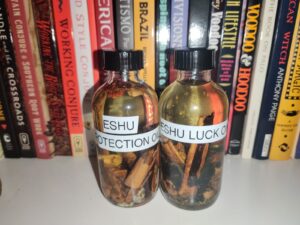 Before you start, give Eshu three pieces of the same candy, and make a deal that if it works well and consistently, you will give Eshu the candy at the bottom. If it has melted by then, then just leave the open jar with the leavings at a crossroads. This should steep in a cool, dry place for 3 months.
Before you start, give Eshu three pieces of the same candy, and make a deal that if it works well and consistently, you will give Eshu the candy at the bottom. If it has melted by then, then just leave the open jar with the leavings at a crossroads. This should steep in a cool, dry place for 3 months.
A modern oil may contain:
- 3 coffee beans
- a dollop of vanilla oleoresin
- 3 drops cinnamon oil
- 3 drops mint oil
- a pinch of sugar
- 3 teaspoons nut based oil, or coconut oil if you want it solid
Make sure to make the same deal with Eshu, with a pinch of sugar.
You would use three drops of Eshu Luck oil on your hands when gambling, playing the lotto, or when doing competitive sports. If you play football, after rubbing it into your hands, smack your thighs three times.
Eshu is a trickster, but he’s also a protector. He sometimes puts things in our path to prevent harm. He is an excellent protector in chaotic times when we can’t always see things clearly. While we are confused, he is calm because he can see all directions at once.
Eshu Protection Oil
There is no way around this but infusion because it needs to have been protected for awhile, to take on the energy of protection. I would normally just add protective ingredients to general Eshu oil, but if you want to make it specific from scratch, do so.
- 30 coffee beans
- 6 black peppercorns
- 6 red peppercorns or a strong red chilli pepper
- a handful of cinnamon chips
- some pieces of coconut or walnut shell, or the outer shell of an acorn, or a well cleaned, dried shell of a mango seed, or a Brazil nut shell
- a vanilla pod, opened and cut into 3 pieces
- a dash of sea salt (as natural as you can get)
Consecrate and keep in a cool, dark place for three months, and treat it very well. You may want to dress up the bottle a bit, and add a piece of jet, which is a very protective stone, to lend its energy.
Eshu or Elegua Incense Recipe
Eshu incense is also fairly easy to make, but you may need to work a bit to acquire some of the ingredients. You will need a mortar and pestle or heavy duty food grinder for this. Some ingredients, you may not be able to find powdered, and this is okay. The resins should be powdered though, and any oils or extracts you add, thoroughly blended throughout the powdered ingredients. You want whatever’s powdered, liquid, or viscous, to coat any larger chunks. This recipe is for a big batch because most of us who are Eshu aware, burn incense for him every Monday.
Ingredients:
- 1/4 cup myrrh, benzoin, or almond resin tears or 1/8 cup powder1/2 cup sandalwood or aloeswood/agarwood/oudh chips or 1/4 cup powder
- 1/4 cup chewing or hookah tobacco, preferably honey flavored
- 1/2 cup roasted coffee beans or 1/4 cup coffee powder1 teaspoon cardamom unless the coffee already has it (it may be called “hel”)
- 1/4 cup star anise or 1/8 cup powder
- 1/4 cup cinnamon bark chips or 1/8 cup cinnamon powder
- 1 heaping teaspoon clove powder
- 1/4 teaspoon red pepper flakes or powder
- 1/4 teaspoon ground black pepper
- enough Eshu oil, added a few drops at a time, to make everything just a little “damp”
- (optional) ground rooster leg bones if you can find them, and if not, large chicken bones
Instructions:
On a Monday, gather all of your ingredients and arrange them on a plate, and when you do your normal offerings and open the ceremony, pass them through the smoke of incense, and ask Eshu to bless them.
Grind the resins thoroughly, and even if everything is already powdered, mash them together in the mortar and pestle. Then add the rest of the dry ingredients, and try to pulverize them as well as you can.
Add the tobacco, and keep pounding. Then add the oil a few drops at a time, until you have a slightly damp, crumbly, sort of sticky mixture.
Transfer this to a glass jar, and let it age in a cool, dark place for three weeks. Then it’s ready to use.
Burn this incense on a piece of charcoal or in a bakhoor burner.
Again, with this recipes vary, but this is the general purpose one.

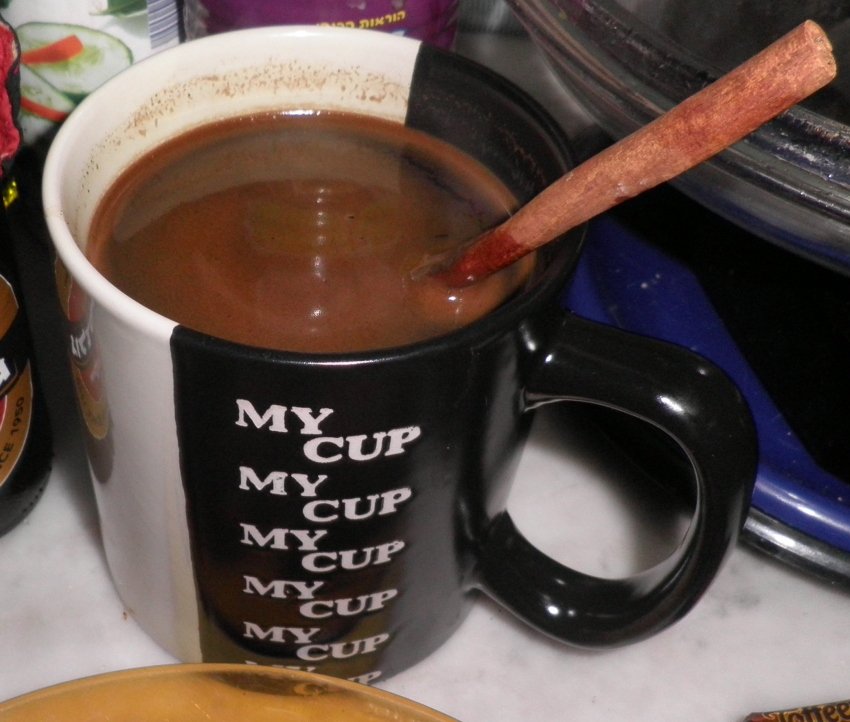
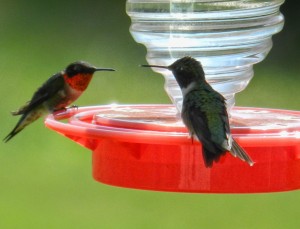
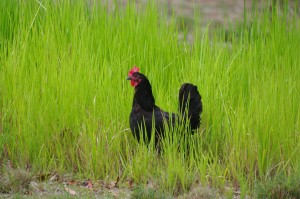
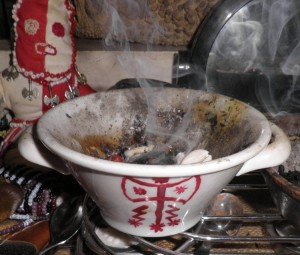
Pingback: Eshu Oil Recipe and Variations | Vodun
Pingback: How to Make Magickal Oils Properly – Zindoki.com
This site has been very helpful. I just can’t find a supply shop close to me. But online is great. Thank you
Often, ingredients are difficult to find, but in most cases you may be able to find what you need in your local area. Look at my recipes as more of a guide unless it specifically says that you have to have certain ingredients for it to work. The ingredients are important, but different places have different herbs that will serve well enough, especially if you are serving local people. Take camphor for instance…in some places it’s a sexy smell, but in others it is repellent to people. Different places have a different level of love for agarwood. How people eat, live, and express themselves has a lot to do with what they’ll need in a magical recipe for it to be effective. Feel your clients and give them what they need. Some things are standards and pretty universal, but some things are not.